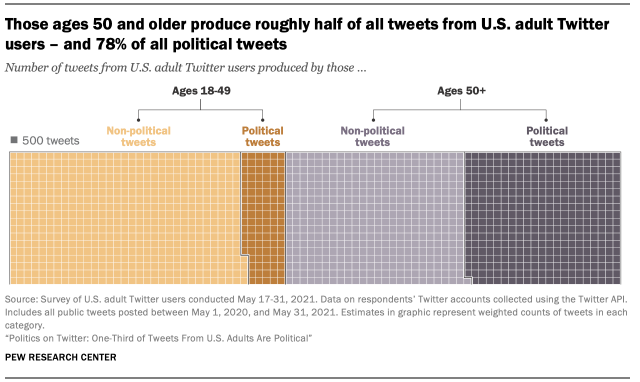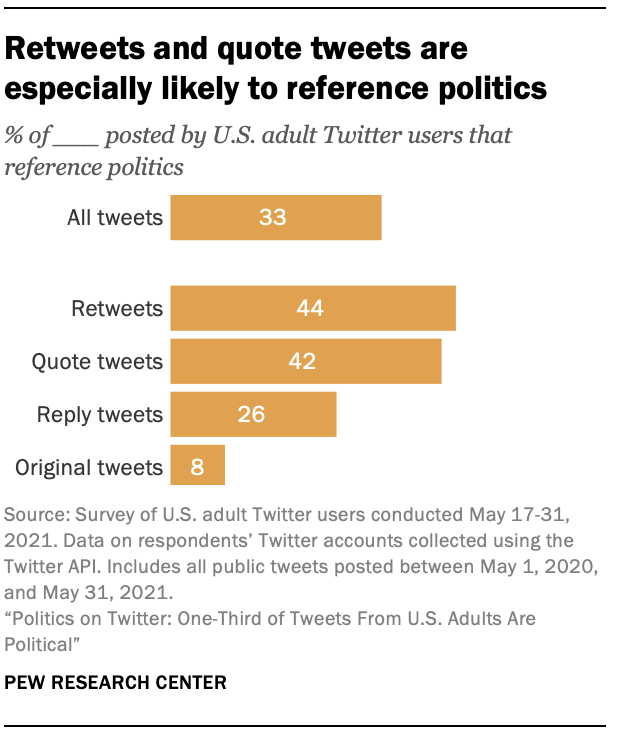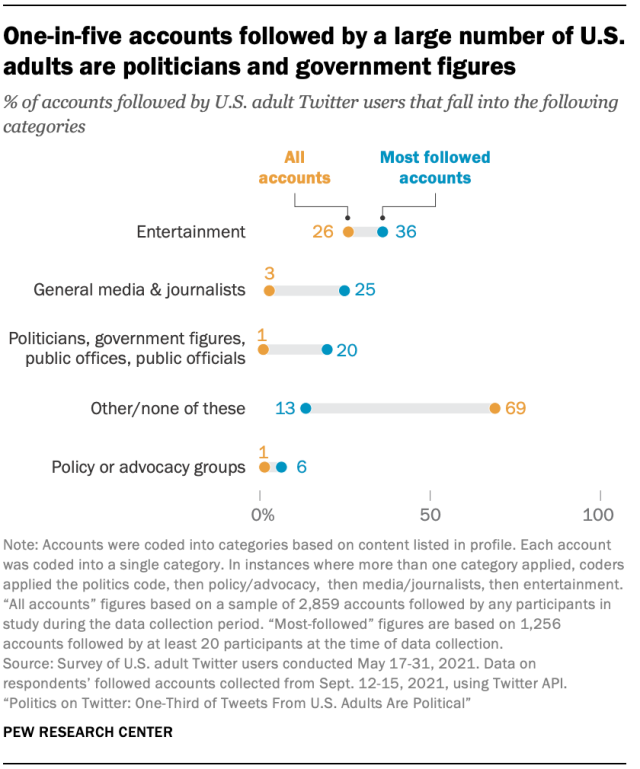Those ages 50 and older produce 78% of all political tweets from U.S. adults
BY SAM BESTVATER, SONO SHAH, GONZALO RIVER0 and AARON SMITH
Pew Research Center conducted this study to gain insight into Twitter users’ political engagement, attitudes and behaviors on the platform. For this analysis, we surveyed 2,548 U.S. adult Twitter users in May 2021 about their experiences on the site, as well as how they engage with politics outside of Twitter. Everyone who took part in this survey is a member of the Center’s American Trends Panel (ATP) – an online survey panel that is recruited through national, random sampling of residential addresses – and indicated that they use Twitter.
In addition to the survey findings, researchers from the Center also examined the actual Twitter profiles of a subset of survey participants who agreed to share their handles for research purposes. First, researchers collected all of the publicly visible tweets posted between May 2020 and May 2021 by these users. Researchers then used a machine learning classifier to identify which of those tweets mentioned politics or political concepts. Second, they collected a random sample of 2,859 accounts followed by at least one of these users – as well as all of the accounts followed by 20 or more respondents – and manually categorized them into different substantive categories based on their profile information. For more information on the different methods used in this analysis, see the report methodology.
Here are the questions used for the report, along with responses, and its methodology.
Roughly one-quarter of American adults use Twitter. And when they share their views on the site, quite often they are doing so about politics and political issues. A new Pew Research Center analysis of English-language tweets posted between May 1, 2020, and May 31, 2021, by a representative sample of U.S. adult Twitter users finds that fully one-third (33%) of those tweets are political in nature.
Echoing the Center’s findings in its prior studies of tweeting behavior, whether political or otherwise, the vast majority of these political tweets are produced by a minority of users. And certain demographic groups are especially active contributors to the overall volume of political content on Twitter. Most notably, Americans ages 50 and older make up 24% of the U.S. adult Twitter population but produce nearly 80% of all political tweets. And 36% of the tweets produced by the typical (median) U.S. adult Twitter user age 50 or older contain political content, roughly five times the share (7%) for the tweets from the typical 18- to 49-year-old.

More broadly, Americans who tweet the most about politics differ in several ways from those for whom politics is a less central topic of discussion. These “high-volume” political tweeters are significantly more likely than other users to say that they use Twitter to express their own opinions (67% vs. 34%); that they talk about politics with others at least once a week (53% vs. 33%); that they contributed to a political campaign in the last year (46% vs. 21%); or that they participate in politics because they enjoy it, as opposed to viewing it as a civic duty (27% vs. 14%).
At the same time, a larger share of these politically vocal users say the people they follow on Twitter have similar political views to their own (45% vs. 25%). And despite – or perhaps because of – their regular forays into the world of political tweeting, those who tweet the most about politics are actually less likely than other users to say that Twitter is an effective way to get people to change their minds about political or social issues. Just 34% of the most active political tweeters feel this way, compared with half of those who tweet less about politics.
This analysis builds on the Center’s previous research on political content on Twitter, which identified relevant content using relatively strict, keyword-based approaches. For instance, our 2019 examination of politics on Twitter focused on discussions of politics at the national level and categorized tweets as political in nature only if they “mention[ed] or express[ed] support or opposition toward national politicians or elected officials, political parties, ideological groups or political institutions, or specific political behaviors like voting.” This definition excluded mentions of state or local politics and politicians, as well as discussions of policy issues and current events that carry a political valence but do not explicitly reference national political figures or groups.
This new analysis identifies political content with more nuance and subtlety. Researchers at the Center trained a supervised machine learning classifier on an expert-validated collection of tweets that human coders had read and categorized according to whether or not they referenced political officials and activists, social issues, or news and current events. This classifier was then able to learn the textual patterns and terms that lead human readers to recognize a tweet as “about politics” and identify such patterns in tweets that humans had not previously coded. With a broader definition of political content and a more flexible classifier, this analysis more comprehensively reflects the range and diversity of political discussion as it occurs on platforms like Twitter. Not surprisingly given these definitional differences, the current analysis identifies a larger share of tweets as political in nature.
Among the other major findings of this examination of the political characteristics, attitudes and online behaviors of U.S. adults on Twitter:

Retweets and quote tweets are more likely to contain political content than original tweets. This analysis of one year of tweets from a representative sample of U.S. adult Twitter users finds that certain types of tweets are more likely than others to contain political content. Roughly four-in-ten retweets (44%) and quote tweets (42%) from these users were found to pertain to politics. But that share falls to 26% for replies – and to just 8% for original tweets.
Democrats and Republicans who use Twitter have different political experiences on the site. A larger share of Democrats than Republicans (including political independents who “lean” toward either party) say they have tweeted about political or social issues in the 30 days preceding the survey (30% vs. 17%). And a larger share of Democrats say that Twitter is very effective at raising public awareness about political or social issues (28% vs. 17%).
Americans from each party also report seeing different types of political content on the site. Democrats who use Twitter are twice as likely as Republicans to say they mostly follow accounts with similar political beliefs to their own (40% vs. 20%) or that they disagree with few or none of the tweets they see (33% vs. 16%).
But some Twitter behaviors cross party lines. Notably, an identical share of Democrats and Republicans on Twitter (17%) say they tweeted about sports in the 30 days preceding the survey.

Political figures make up 20% of the accounts followed by a large number of U.S. adults. Politicians, government figures, public offices, and public officials make up just 1% of all the accounts followed by this representative sample of U.S. adult Twitter users. But these entities are far more prevalent among the most-followed accounts: Fully 20% of the accounts followed by at least 20 individual respondents fall into this category. Media organizations and journalists, as well as policy or advocacy organizations, are also notably more prevalent in the accounts that are widely followed by U.S. adults on Twitter.
“Twitter-only” political engagement is relatively rare. The Center’s survey asked about a variety of political behaviors that users might take, both on Twitter (such as tweeting about a political or social issue) and off (such as voting or contributing money to a campaign). The vast majority of Twitter users engaged in at least one of these activities in the preceding year. By far the largest share – 58% – engaged both on Twitter and elsewhere, and another 34% took part only in non-Twitter efforts. Just 3% of U.S. adult Twitter users say they took some sort of political or civic action on Twitter in the last year but did not do so outside the platform.
Users say political content makes up a larger share of what they see than of what they post. Some 41% of U.S. adult Twitter users say that a lot of what they see on Twitter is related to political or social issues. But just 12% say a lot of what they themselves post is related to these topics.


